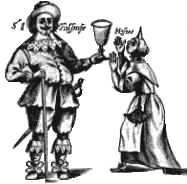The players
A traveller to London in 1617 wrote:
The City of London alone hath four or five companies of players with their peculiar [own] theatres capable of [holding] many thousands, wherein they all play every day in the week but Sunday, with most strange concourse of people . . . as there be, in my opinion, more plays in London than in all the parts of the world I have seen, so do these players or comedians excel all others in the world.
(Fynes Moryson in his Itinerary, 1617. Moryson was a graduate of Cambridge; his travel journal provides valuable insight into the Europe of his time.)
We know the names of over a thousand players between the years 1590 and 1642. Most of them were poor*, although perhaps twenty famous actors acquired respectable estates.*
Footnotes
-
An actor's wages
Philip Henslowe paid 5 shillings a week to hired men when the company was travelling; 10 shillings a week in London. The lowest pay for players was 1 shilling per day. Although their pay was low, hired men may have looked forward to the possibility of becoming sharers. The boys of the company earned even less--in 1600 the Admiral's Men paid one boy 3 shillings per week.
The usual fee for a play at court was 10 pounds. Although it was not a great amount, the companies which played at court gained prestige and royal protection from the City Fathers. Admission to the Globe and similar theatres was approximately one penny to one shilling; the Blackfriars ranged from 6 pence, to 2 shillings and 6 pence. The gallery receipts for the Admiral's Men was £20 a week on average in 1597, according to Henslowe's Diary.
(Go to the section on the value of money.)
-
Respectability at last
From 1572 to 1642, the social status of players rose, as they became connected to noble and eventually royal patrons. Elizabeth had the companies play at court four to eight times a year; James and Charles had twenty or more performances a season.
